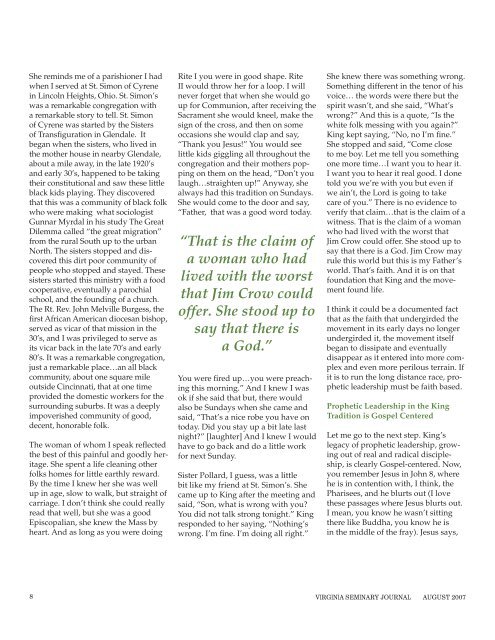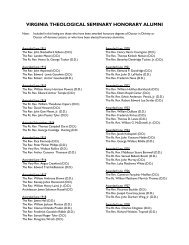Seminary Journal 2008 (August) - Virginia Theological Seminary
Seminary Journal 2008 (August) - Virginia Theological Seminary
Seminary Journal 2008 (August) - Virginia Theological Seminary
Create successful ePaper yourself
Turn your PDF publications into a flip-book with our unique Google optimized e-Paper software.
She reminds me of a parishioner I had<br />
when I served at St. Simon of Cyrene<br />
in Lincoln Heights, Ohio. St. Simon’s<br />
was a remarkable congregation with<br />
a remarkable story to tell. St. Simon<br />
of Cyrene was started by the Sisters<br />
of Transfi guration in Glendale. It<br />
began when the sisters, who lived in<br />
the mother house in nearby Glendale,<br />
about a mile away, in the late 1920’s<br />
and early 30’s, happened to be taking<br />
their constitutional and saw these little<br />
black kids playing. They discovered<br />
that this was a community of black folk<br />
who were making what sociologist<br />
Gunnar Myrdal in his study The Great<br />
Dilemma called “the great migration”<br />
from the rural South up to the urban<br />
North. The sisters stopped and discovered<br />
this dirt poor community of<br />
people who stopped and stayed. These<br />
sisters started this ministry with a food<br />
cooperative, eventually a parochial<br />
school, and the founding of a church.<br />
The Rt. Rev. John Melville Burgess, the<br />
fi rst African American diocesan bishop,<br />
served as vicar of that mission in the<br />
30’s, and I was privileged to serve as<br />
its vicar back in the late 70’s and early<br />
80’s. It was a remarkable congregation,<br />
just a remarkable place…an all black<br />
community, about one square mile<br />
outside Cincinnati, that at one time<br />
provided the domestic workers for the<br />
surrounding suburbs. It was a deeply<br />
impoverished community of good,<br />
decent, honorable folk.<br />
The woman of whom I speak refl ected<br />
the best of this painful and goodly heritage.<br />
She spent a life cleaning other<br />
folks homes for little earthly reward.<br />
By the time I knew her she was well<br />
up in age, slow to walk, but straight of<br />
carriage. I don’t think she could really<br />
read that well, but she was a good<br />
Episcopalian, she knew the Mass by<br />
heart. And as long as you were doing<br />
Rite I you were in good shape. Rite<br />
II would throw her for a loop. I will<br />
never forget that when she would go<br />
up for Communion, after receiving the<br />
Sacrament she would kneel, make the<br />
sign of the cross, and then on some<br />
occasions she would clap and say,<br />
“Thank you Jesus!” You would see<br />
little kids giggling all throughout the<br />
congregation and their mothers popping<br />
on them on the head, “Don’t you<br />
laugh…straighten up!” Anyway, she<br />
always had this tradition on Sundays.<br />
She would come to the door and say,<br />
“Father, that was a good word today.<br />
“That is the claim of<br />
a woman who had<br />
lived with the worst<br />
that Jim Crow could<br />
offer. She stood up to<br />
say that there is<br />
a God.”<br />
You were fi red up…you were preaching<br />
this morning.” And I knew I was<br />
ok if she said that but, there would<br />
also be Sundays when she came and<br />
said, “That’s a nice robe you have on<br />
today. Did you stay up a bit late last<br />
night?” [laughter] And I knew I would<br />
have to go back and do a little work<br />
for next Sunday.<br />
Sister Pollard, I guess, was a little<br />
bit like my friend at St. Simon’s. She<br />
came up to King after the meeting and<br />
said, “Son, what is wrong with you?<br />
You did not talk strong tonight.” King<br />
responded to her saying, “Nothing’s<br />
wrong. I’m fi ne. I’m doing all right.”<br />
She knew there was something wrong.<br />
Something different in the tenor of his<br />
voice… the words were there but the<br />
spirit wasn’t, and she said, “What’s<br />
wrong?” And this is a quote, “Is the<br />
white folk messing with you again?”<br />
King kept saying, “No, no I’m fi ne.”<br />
She stopped and said, “Come close<br />
to me boy. Let me tell you something<br />
one more time…I want you to hear it.<br />
I want you to hear it real good. I done<br />
told you we’re with you but even if<br />
we ain’t, the Lord is going to take<br />
care of you.” There is no evidence to<br />
verify that claim…that is the claim of a<br />
witness. That is the claim of a woman<br />
who had lived with the worst that<br />
Jim Crow could offer. She stood up to<br />
say that there is a God. Jim Crow may<br />
rule this world but this is my Father’s<br />
world. That’s faith. And it is on that<br />
foundation that King and the movement<br />
found life.<br />
I think it could be a documented fact<br />
that as the faith that undergirded the<br />
movement in its early days no longer<br />
undergirded it, the movement itself<br />
began to dissipate and eventually<br />
disappear as it entered into more complex<br />
and even more perilous terrain. If<br />
it is to run the long distance race, prophetic<br />
leadership must be faith based.<br />
Prophetic Leadership in the King<br />
Tradition is Gospel Centered<br />
Let me go to the next step. King’s<br />
legacy of prophetic leadership, growing<br />
out of real and radical discipleship,<br />
is clearly Gospel-centered. Now,<br />
you remember Jesus in John 8, where<br />
he is in contention with, I think, the<br />
Pharisees, and he blurts out (I love<br />
these passages where Jesus blurts out.<br />
I mean, you know he wasn’t sitting<br />
there like Buddha, you know he is<br />
in the middle of the fray). Jesus says,<br />
8 VIRGINIA SEMINARY JOURNAL AUGUST 2007



